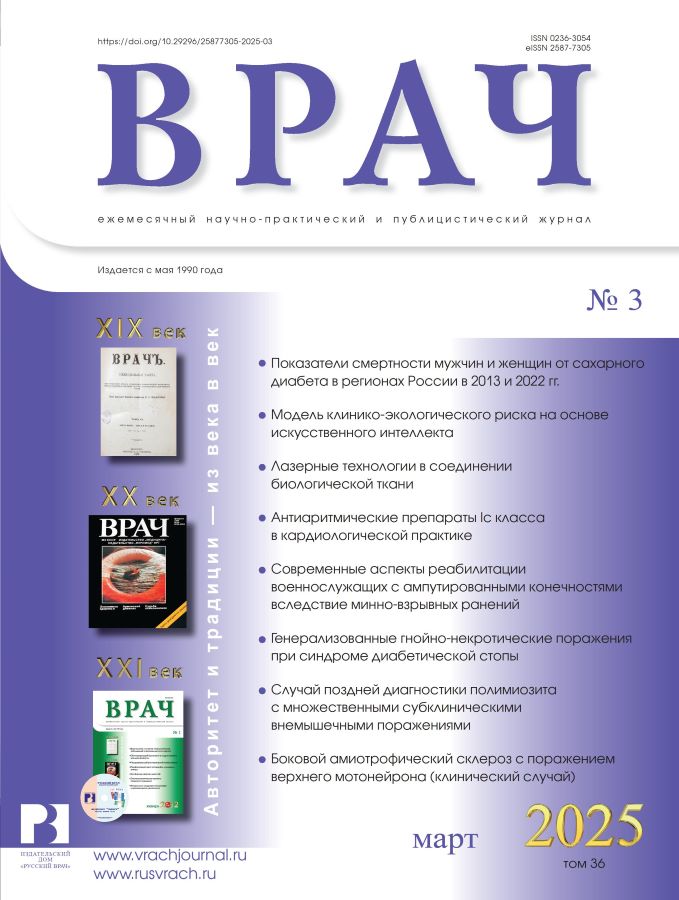Wernicke-Korsakoff syndrome after bariatric surgery: a clinical case
- Authors: Osipova D.A.1,2
-
Affiliations:
- Kamchatka Neurological Clinic
- Lukashevsky Kamchatka Regional Hospital
- Issue: Vol 36, No 3 (2025)
- Pages: 81-84
- Section: From Practice
- URL: https://journals.eco-vector.com/0236-3054/article/view/678118
- DOI: https://doi.org/10.29296/25877305-2025-03-15
- ID: 678118
Cite item
Abstract
Wernicke-Korsakoff encephalopathy is difficult to diagnose an urgent condition, caused by a deficiency of vitamin B1 (thiamine). The main reason for the development of the disease is chronic alcoholism. Non-alcoholic causes of Wernicke-Korsakoff encephalopathy include acquired immune deficiency syndrome, malnutrition, pathology of the gastrointestinal tract and surgical interventions on it, multiple organ failure, program hemodialysis, long-term treatment with furosemide, etc. In Russia, the number of bariatric surgeries is increasing annually; therefore, not only neurologists, but also physicians of other specialties are increasingly likely to encounter this pathology in clinical practice. It must be remembered that neurological disorders after bariatric surgery due to vitamin deficiency may be of an erased nature, and diagnostic tools that allow timely recognition of encephalopathy are far from perfect. All of the above determines the need to conduct new experimental and clinical studies in this area of neurology. In order to raise awareness and improve clinicians' professional knowledge of the gastroenterologic causes of vitamin B1 deficiency, this article presents a clinical case of Wernicke-Korsakoff syndrome that developed after bariatric surgery.
Full Text
About the authors
D. A. Osipova
Kamchatka Neurological Clinic; Lukashevsky Kamchatka Regional Hospital
Author for correspondence.
Email: Evrynoma@mail.ru
Russian Federation, Petropavlovsk-Kamchatsky; Petropavlovsk-Kamchatsky
References
- Nilsson M., Sonne C. Diagnostics and treatment of Wernike-Korsakoff syndrome patients with an alcohol abuse. Ugeskr Laeger. 2013; 175 (14): 942–4.
- Thorarinsson B.L., Olafsson E., Kjartansson O. et al. Wernike’s encephalopathy in chronic alcoholics. Laeknabladid. 2011; 97 (1): 21–9. doi: 10.17992/lbl.2011.01.338
- Netravathi M., Sinha S., Taly A.B. et al. Hyperemesisgravidarum-induced Wernike’s encephalopathy: Serial clinical, elecrophysiological and MR imaging observations. J Neurol Sci. 2009; 284 (1-2): 214–6. doi: 10.1016/j.jns.2009.05.004
- Kantor S., Prakash S., Chandwani J. et al. Wernike’s encephalopathy following huperemesis grawidarum. Indian J Crit Care Med. 2014; 18 (3): 164–6. doi: 10.4103/0972-5229.128706
- Delavar Kasmaei H., Baratloo A., Soleymani M. et al. Imaging-based diagnosis of Wernicke encephalopathy: a case report. Trauma Mon. 2014; 19 (4): e17403. doi: 10.5812/traumamon.17403
- Dubey P., Narvekar S., Nadkarniand D.S. et al. Wernicke’s encephalopathy with generalized weakness in a woman with hyperemesis gravidarum and gestational thyrotoxicosis: a case report of a rare co-occurrence with literature review. International Journal of Case Reports in Medicine. 2016; 2016: Article ID 376298. doi: 10.5171/2016.376298
- Phayphet M., Rafat C., Anreux F. et al. Heperemesis gravidarum: a rare cause of Wernicke encephalopathy. Presse Med. 2007; 36 (12, Pt. 1): 1756–61. doi: 10.1016/j.lpm.2007.05.021
- Lallas M., Desai J., Wernicke encephalopathy in children and adolescents. World J. Pediatr. 2014; 10 (4): 293–8. doi: 10.1007/s12519-014-0506-9
- Scalzo S.J., Bowden S.C., Amrose M.L. et al. Wernicke-Korsakoff syndrome notrelated to alcohol use: a systematic review. J Neurol Neurosurg Psychiatry. 2005; 86 (12): 1362–8. doi: 10.1136/jnnp-2014-309598
- Manzo G., De Gennaro A., Cozzolino A. et al. MR imaging findings in alcoholic and nonalcoholic acute Wernike’s encephalopathy: a review. Biomed Res Int. 2014; 2014: 503596. doi: 10.1155/2014/503596
- Сиволап Ю.П., Дамулин И.В. Энцефалопатия Вернике и корсаковский психоз: клинико-патогенетические соотношения, диагностика и лечение. Журнал неврологии и психиатрии им. С.С. Корсакова. 2013; 113 (6-2): 20–6 [Sivolap Iu.P., Damulin I.V. Wernicke encephalopathy and Korsakoff's psychosis: clinical-pathophysiological correlation, diagnostics and treatment. S.S. Korsakov Journal of Neurology and Psychiatry. 2013; 113 (6-2): 20–6 (in Russ.)].
- Day G.S., del Campo C.M. Wernicke encephalopathy: a medical emergency. CMAJ. 2014; 186 (8): E295. doi: 10.1503/cmaj.130091
- Lough M.E. Wernicke’s encephalopathy: expanding the diagnostic toolbox. Neuropsychol Rev. 2012; 22 (2): 181–94. doi: 10.1007/s11065-012-9200-7
- Uzkeser M., Akoz A., Ozdemir G. et al. Wide central pontine, bulbar and thalamic myelinolysis with sequela. Eurasian J Med. 2012; 44 (3): 179–81. doi: 10.5152/eajm.2012.42
- Gayathri K.B., Bhargav P.R. Hyperemesis gravidarum is a syndrome of metabolic and endocrine disturbances: a case description. Indian J Clin Biochem. 2014; 29 (3): 390–2. doi: 10.1007/s12291-013-0384-2
- Sutamnartpong P., Muengtaweepongsa S., Kulkantrakorn K. Wernicke’s encephalopathy and central pontine myelinolysis in hyperemesis gravidarum. J Neurosci Rural Pract. 2013; 4 (1): 39–41. doi: 10.4103/0976-3147.105608
- Морбидное ожирение. Под ред. И.И. Дедова. М.: Медицинское информационное агентство, 2014 [Morbid obesity. Ed. by I.I. Dedov. Moscow: Medical Information Agency, 2014 (in Russ.)].
- Polymeris A. The pluses and minuses of bariatric surgery for morbid obesity: An endocrinological perspective. Hormones. 2012; 11 (3): 223–40. doi: 10.14310/horm.2002.1353
- Koffman B.M., Greenfield L.J., Ali I.I. et al. Neurologic complications after surgery for obesity. Muscle Nerve. 2006; 33 (2): 166–76. doi: 10.1002/mus.20394
- Koffman B.M., Mandel S., Katz O.A. Neurological Complications of Bariatric Surgery. Practical Neurology. 2006; 11: 19–21.
- Chang C.G., Adams-Huet B., Provost D.A. Acute post-gastric reduction surgery (APGARS) neuropathy. Obes Surg. 2004; 14: 182–9. doi: 10.1381/096089204322857537
Supplementary files






